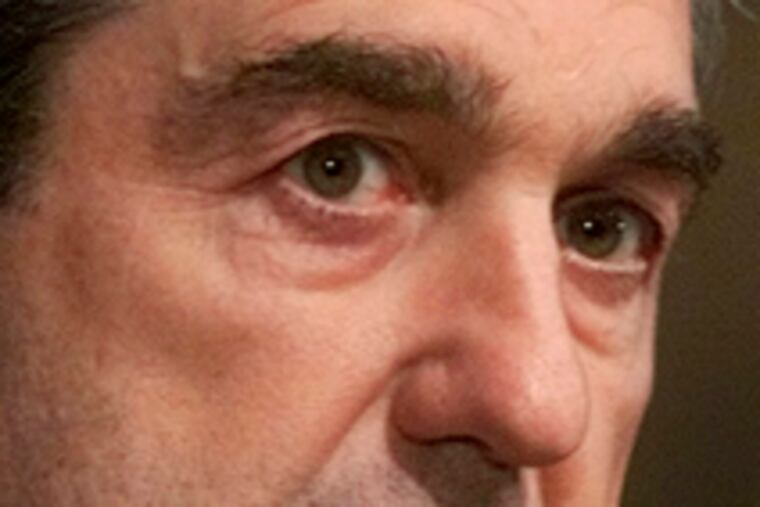Sue top officials? Justices unclear
They aired concern but did not say defendants had to be removed in a detainee-abuse case.

WASHINGTON - Supreme Court justices voiced concern yesterday about including former Attorney General John Ashcroft and FBI Director Robert S. Mueller in a lawsuit that alleges that prisoners detained after the Sept. 11 attacks were abused because of their religion and ethnicity.
Yet the court offered no clear indication it was prepared to order Ashcroft and Mueller removed from a suit filed by Javaid Iqbal, a Pakistani Muslim kept nearly six months in solitary confinement in New York in 2002.
The case will help determine when cabinet officers and other high-ranking officials can be sued over allegations that lower-level government workers have violated people's civil rights.
Iqbal, since deported from the United States, says Ashcroft, Mueller and others implemented a policy of confining detainees in highly restrictive conditions because of their religious beliefs or race.
"The question here is, who is responsible?" said Iqbal lawyer Alexander Reinert, who is based in Yonkers, N.Y.
Iqbal does not contend that Ashcroft or Mueller singled him out. He says they devised the policy that led to his arrest and restrictive detention. For now, Iqbal does not have to show more than that, Reinert said.
Solicitor General Gregory Garre argued on behalf of Ashcroft and Mueller that nothing in Iqbal's complaint tied the allegedly discriminatory acts of lower-level officials to his clients.
"The higher up the chain of command you go, the less plausible it is that the high-level official, like the attorney general, is going to be aware of . . . the sort of microscopic decisions here," Garre said.
Justice Antonin Scalia made clear he would side with the officials. "I don't know on what basis any of these allegations against the high-level officials are made," Scalia said.
The U.S. Court of Appeals for the Second Circuit, in New York, said the lawsuit could proceed but added that Ashcroft, Mueller, and 32 other former and current government employees named in it could be dismissed as defendants if evidence showed they were not sufficiently involved in the activities alleged.
The appeals court ruling may offer the justices a way to resolve the case narrowly.
But, Justice Samuel Alito asked, what if another court in another lawsuit was more aggressive?
Reinert said the high court could establish the Second Circuit's ruling as the model.
Iqbal was arrested at his Long Island home Nov. 2, 2001, and charged with nonviolent federal crimes unrelated to terrorism. Two months later, he was moved to a holding facility in Brooklyn, where he was in solitary confinement for more than 150 days without a hearing.
He said he was subjected to physical and verbal abuse, including unnecessary strip searches.
He was cleared of involvement in terrorism and was deported in January 2003 after pleading guilty to credit-card fraud and being sentenced to 16 months in prison.
The appeals court said some forms of government action that otherwise would not be proper were permitted in emergencies.
But it said most of the rights cited in the lawsuit "do not vary with surrounding circumstances, such as the right not to be subjected to needlessly harsh conditions of confinement, the right to be free from the use of excessive force, and the right not to be subjected to ethnic or religious discrimination."
The case is
Ashcroft and Mueller v. Iqbal
.